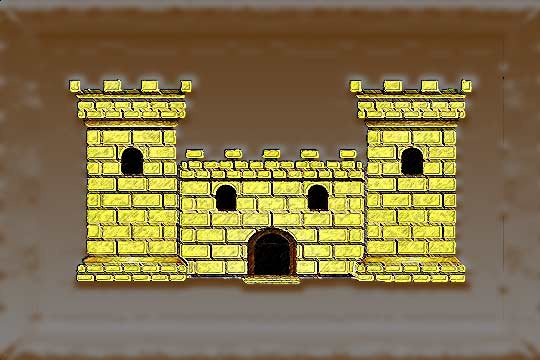Salakos, Rhodes, Dodecanese,South Aegean
Castle of Salakos
| Location: |
| At the center of the village Salakos in Rhodes island |
| Region > Prefecture: |  |
| South Aegean Dodecanese | |
| Municipality > Town: | |
| City of Rhodes • Salakos | |
| Altitude: | |
|
Elevation ≈ 220 m (Relative Height≈0 m) |
| Time of Construction | Origin | |
| early 16th cent. | IOANNITE |
|
| Castle Type | Condition | |
| Castle Ruins |
Few Remains
|
Sparse ruins of a four-winged castle of the Chivalric Order of St. John (Hospitaller Knights) in the village.
Castle Description
Text: Dr. Michael Losse – Singen (Hohentwiel), GermanyGeneral description
Salakos is an inland village on Rhodes Island, situated on the north-western slope of the Profítis Ilías Mountain, the third highest mountain on Rhodes. The location of the castle offers wide views to the Turkish coast.
In the eastern part of the modern village one can find the sparse ruins of a Knights Hospitallers’ castle, about whose building history is little known. A relief-stone with coat of arms of the Hospitallers‘ Grandmaster Pierre d’Amboise (ruled from 1505 till 1512), which still existed in the 19th century, proves construction work during his term of office, although it remains unclear whether it was a newly built or an extension of an older castle.
Between houses and private residences and partly overgrown, after demolition works in the 19th and 20th centuries, only two parallel wall fragments are recognizable, one up to about 2m above today's ground level and about 1.30m strong. It is a quarry stone masonry, which was apparently plastered on the outside or covered with a strong layer of mortar.
The German traveller, artist and researcher Albert Berg (1862, pp. 108-109) still saw “a stately knight’s castle [...]. At its four corners stood towers, which were partly taken down by the Turks and used to build a mosque. Inside, airy [barrel-] vaults run around a square courtyard, over whose roof merlons rose” (in the original German text: „ein stattliches Ritterschloss […]. An seinen vier Ecken standen Thürme, welche von den Türken zum Theil abgetragen und zum Baue einer Moschee benutzt worden sind. Im Inneren laufen um einen viereckigen Hof luftige [Tonnen-]Gewölbe, über deren Dache sich der Zinnenkranz erhob“).
Extensive building stock shows the drawing “Ruines du Chateau de Salako vers le Sud” in the “History of the Island of Rhodes” by Joh. Hedenborg (1854). Like the castle at Apóllona (Rhodes) the castle of Sálakos was among the rectangular complexes, which consisted of four single-storey, barrel-vaulted wings, whose roofs probably served as defensive platforms. The drawing of the Swedish researcher and medical doctor Dr. Johan Hedenborg mentioned above shows significantly more masonry of the ruins than is preserved today.
Access (route / entrance)
The partly overgrown wall remnants of the castle are difficult to see from the village road (partly private area). Parking area close to the church.
History of the castle/tower
The castle was built by the Order of the Knights of St. John (Hospitaller Knights) maybe in the late 15th or early 16th century to protect the villagers against Ottoman and pirate raids. A relief-stone with coat of arms of the Hospitallers‘ Grandmaster Pierre d'Amboise (ruled from 1505 till 1512) still existing in the 19th century, proves construction work during his rule.
Other Info
SourcesLosse, Michael: Die Burgen und Festungen des Johanniter-Ritterordens auf Rhódos und in der Ägäis (Griechenland) 1307-1522. (Publisher: Nünnerich-Asmus Verlag) Mainz 2017.
Stefanidou, Alexandra: Castles of the Knights Hospitallers. In: Anna Triposkoufi/Amalia Tsitouri (Ed.): Venetians and Knights Hospitallers. Athens 2002, pp. 184-253.
ΣΤΕΦΑΝΙΔΟΥ, Αλεξάνδρα Στ.:Η Μεσαιωνική Ρόδος. Με βάση το χειρόγραφο και την εικονογράφηση του Johannes Hedenborg (1854). / The Medieval Rhodes. Based on the Manuscript and Illustrations of Johannes Hedenborg (1854). 2004.
| First entry in Kastrologos: | December 2020 |
Sources
- Text and photographs (2008) by Dr. Michael Losse
|
|
| Access |
|---|
| Entrance: |
| The partly overgrown wall remnants of the castle are difficult to see from the village road (partly private area). Parking area close to the church. |



